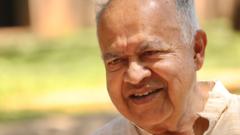

The world of astrophysics recently mourned the loss of Dr. Jayant Vishnu Narlikar, a distinguished Indian scientist who passed away on May 20, 2025, at the age of 86. Narlikar was not only a celebrated cosmologist but also a science communicator, a science fiction writer, and an institution builder who left an indelible mark on India's scientific landscape. He is best known for his work with Sir Fred Hoyle on the Hoyle-Narlikar theory of gravitation and his advocacy for the Steady-State theory and Quasi-Steady State Cosmology (QSSC) as alternatives to the widely accepted Big Bang theory.
Born in 1938, Jayant Narlikar came from an academic family. He excelled in his studies, earning his B.Sc. degree from Banaras Hindu University in 1957 and later pursuing higher education at Cambridge University. It was at Cambridge where he worked with the renowned astrophysicist Sir Fred Hoyle, completing his PhD and developing the Hoyle-Narlikar theory of gravitation. This theory offered an alternative to Einstein's general relativity, synthesizing it with Mach's principle, which posits that the inertia of an object is influenced by the distribution of mass throughout the universe.
Narlikar's most significant challenge to mainstream cosmology came with his steadfast support for the Steady-State theory, later refined into the Quasi-Steady State Cosmology (QSSC). Developed in collaboration with Fred Hoyle and Geoffrey Burbidge, QSSC proposed that the universe has no beginning or end in time, existing in a perpetual steady state. To account for the observed expansion of the universe, the theory introduced the concept of continuous matter creation, maintaining a constant overall density. This contrasted sharply with the Big Bang theory, which posits that the universe originated from a singular explosive event approximately 13.8 billion years ago.
While the Big Bang theory gained widespread acceptance due to substantial observational evidence, Narlikar remained a proponent of the steady-state model, even writing "The Big Bang is an exploding myth" outside his office. He argued that the Big Bang theory had several shortcomings, including its reliance on a singular point where the laws of physics break down and its resemblance to religious creation stories. Narlikar believed that science should remain independent of such notions and that the universe evolved slowly over time.
Despite the dominance of the Big Bang theory, the Hoyle-Narlikar theory remains a significant and influential contribution to theoretical cosmology. It encouraged scientific skepticism and inquiry, reminding scientists not to become overly comfortable with existing models. Narlikar's work advanced mechanisms by which matter could be continuously created and destroyed in an infinite universe.
Beyond his theoretical contributions, Narlikar was instrumental in building scientific institutions in India. He returned to India in 1972 to join the Tata Institute of Fundamental Research (TIFR), where he played a key role in developing the Theoretical Astrophysics Group. In 1988, he established the Inter-University Centre for Astronomy and Astrophysics (IUCAA) in Pune, serving as its director until 2003. IUCAA has become a leading center for astronomical and astrophysical research in India, fostering collaborative academic research and shaping a generation of Indian researchers.
Narlikar was also a passionate science communicator, authoring numerous books, articles, and science fiction stories in both Marathi and English. His writings made complex scientific ideas accessible to the public, inspiring countless young minds to pursue science. He firmly believed that science was not just for laboratories and journals but belonged to everyone.
In recognition of his outstanding contributions, Narlikar received numerous prestigious awards, including the Padma Bhushan in 1965, the Padma Vibhushan in 2004, the Maharashtra Bhushan in 2010, the Sahitya Akademi Award in 2014, and UNESCO's Kalinga Prize in 1996.
The passing of Dr. Jayant Vishnu Narlikar is a monumental loss to the scientific community. He was a visionary astrophysicist, a dedicated educator, and a staunch advocate for rational thinking. His legacy endures through his groundbreaking research, the institutions he built, and the countless individuals he inspired to explore the mysteries of the cosmos. As Deputy Chief Minister Ajit Pawar noted, "a radiant star in the firmament of knowledge and science has fallen," but the light of his contributions will continue to shine for generations to come.